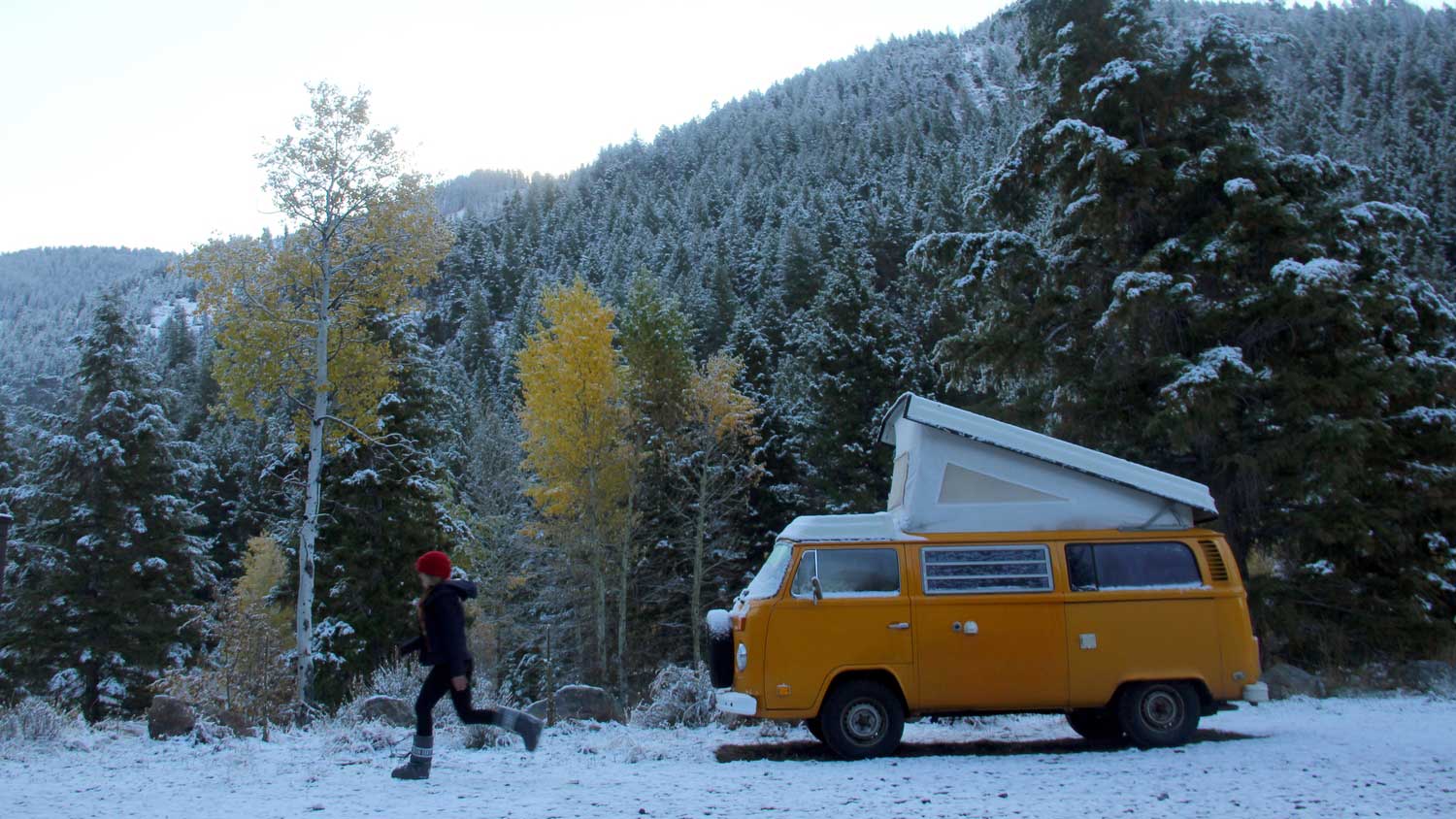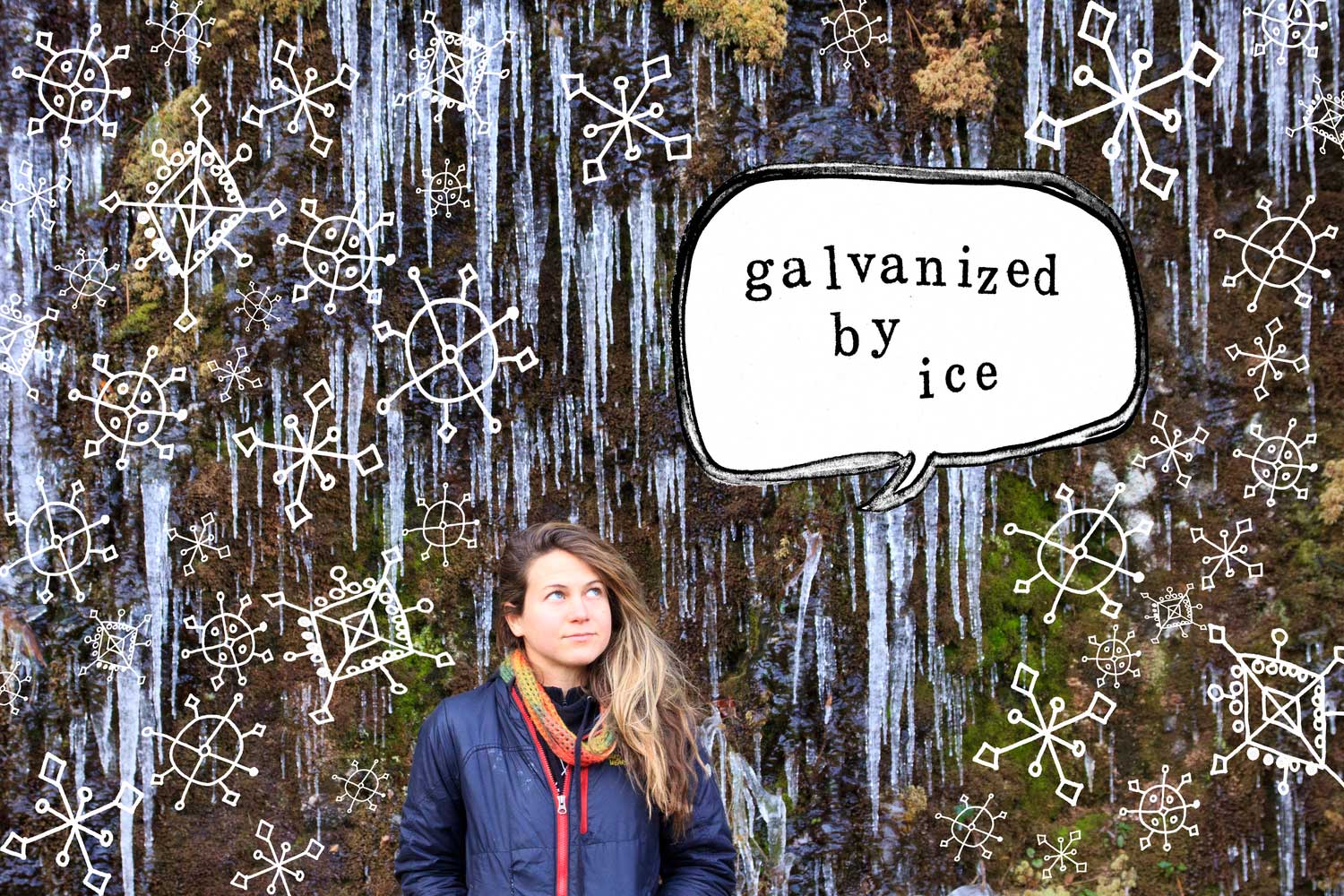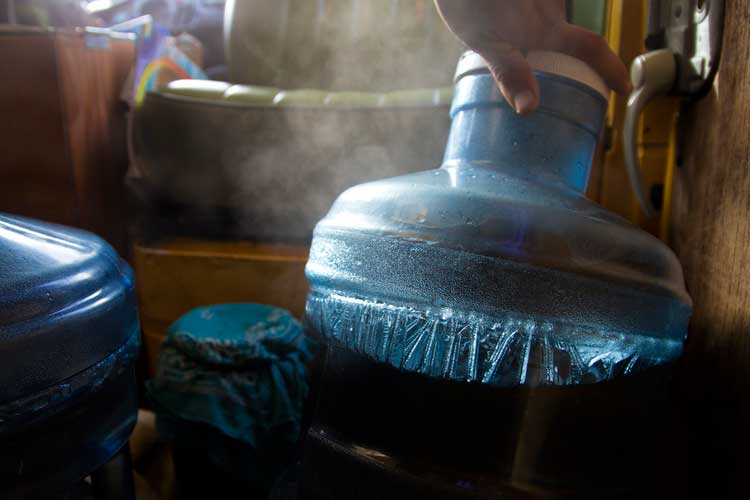Living in the Elements

Living In The Elements
Text & Illustrations By Kit Whistler
Photos by Kit Whistler and J.R. Switchgrass, Idle Theory Bus
Five inches of snow fell in eight hours.
We shivered just south of the Canadian Border. Montana. October was newly arrived, but it was an October I had never before known. In the high Rockies, seasons are capricious. Summer will court you with its greenery and sun, its midday swims, only to jet south on a fine day in late September, gone until next year’s melted frost.
The storm carried on for days. A northerly wind slammed into our bus, solid as a steamer. Alive, that wind was. It whined and wailed, lost in the leafless maze of aspen groves. It slid by with a cartoony whistle, only to circle back around and blast us with the fury of its self wrought isolation.

(C) 2015 Idle Theory Bus
J.R., ever straight and steady, yanked down the canvas pop top.
“That last gust almost ripped it straight off,” he said.
I sat on the green vinyl of our backseat bench, my body folded into small strange angles under four layers of clothing. Our five gallon water jug froze completely solid the previous night, a huge glacier in the slick floor. J.R. tapped on it with gloved hands and it cracked. I looked out the window. Sparkly asterisks of frost warped my view of the world outside. Snow spiraled thickly from the sky.

(C) 2015 Idle Theory Bus

(C) 2015 Idle Theory Bus
“This doesn’t seem like Earth,” I said.
“It’s her dark side.”
We were camped in an evergreen vale near the town of Babb. The Blackfeet Indian Tribe used to hide from the wind in these same valleys. With the first cold, they settled temporary camps at the base of the Rockies. Here, woods stand firm through winter, a slight shelter from the turbulence of the plains.
That’s what nomads do. They move with the seasons. Only we had done it backwards. In summer we bore the heavy heat of the desert and now we weathered the fall snows of Montana. We had a lot to learn.
I thought back to a day in July. Winnemucca. We parked in a dusty Dollar General parking lot. Unbearable heat radiated from its hard black asphalt. Temperatures floated high that mercury afternoon, well over 110. We worried that our air-cooled engine might overheat.
I wore a beige bra and calico swimsuit bottoms. The day was too oppressive for real clothing. I drank juice as warm as hot kettle tea. Beads of sweat ran down the soft backs of my knees and collected in puddles around my bare burnt feet.

(C) 2015 Idle Theory Bus
In the desert summer, I was sure I’d never feel cold again. Yet, here I sat, two states and two months later, cold in a 15-degree morning. The varied conditions of our planet are difficult to grasp. We live through many shifting moods of the same earth, the same continent, the same general region, scarcely a season apart. But it is only because we know heat that snow is welcome.
I grin my teeth at the soft snow and run about its powdery carpet. My dash invigorates me. My nose runs. My toes are wet. And I am glad.
I’ve traveled the North American Road for over two years. Living outside, I discovered that moments of suffering free me from myself. It goes contrary to conventional thought. People work long and hard to attain a comfortable life. But that has gone too far. We are a species that suffers from boredom.
We are meant to live in extremes. Our bodies are made to sweat in the natural light of an interminable sun. We crave brittle mornings of cold. Our muscles long to shiver sometimes in subzero winds. Discomfort brings about great joy.
In our quest for comfort, we have created an utterly dull existence; an existence I escaped through reconnection with the physical world.

(C) 2015 Idle Theory Bus
My stationary life passed in a temperature-controlled torpor. In my air-conditioned apartment, I never felt the light pleasure of a summer rainstorm, the cool breeze it brought. I only knew the flick of a fan, the hum of a heater. In the bus, we have no heater. No air conditioner. We are exposed to the weather. At times it’s tough, but it’s never boring.
Perhaps that is why this movement of van dwelling, of backpacking, of tiny houses, has come about. We want to live in the real world. We desire the fear of an incoming weather pattern. We need it to experience the still that settles after. A physically easy life causes mental distress. A physically demanding life calms the mind.
I sip my morning coffee, hot and heavy in my hands. Soon we head south, where we’ll winter in moderation. But now I walk on the snow and quiver in contentment. This storm, this cold, is absolutely essential. I am alive.

Cartoon by Kit Whistler
Kit Whistler is a fulltime thinker and part time writer/cartoonist. For the last two years she has lived and traveled in a ’76 VW Bus named Sunshine. She enjoys listening to birdcalls, sleeping on the ground, and reading up on leisure theory. You can follow the journey at www.idletheorybus.com and on Instagram.
LOVE!